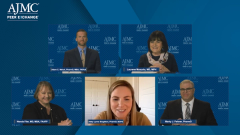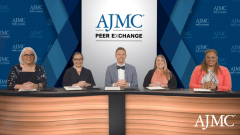
Populations At Risk for Contracting RSV
Traditionally thought of as a pediatric disease, RSV also affects older patient populations.
Episodes in this series

Adam C. Welch, PharmD, MBA, FAPhA: When we think about RSV [respiratory syncytial virus], a lot of people think it only presents in children, that this is a pediatric condition, but it’s not.
Laurene Mascola, MD, MPH: No. In fact, it does affect adults very seriously. There are 3 groups of adults we want to look at that are affected by RSV. No. 1 are those people over 65 years of age. First of all, as we get older, so do our T and B cells. We see a decrease in the number of T cells and a decrease in the function of T cells. We have some immunosenescence, which makes us at risk not only for RSV but for other viral diseases.
Additionally, we see adults with significant comorbidities, such as those who have underlying lung and heart conditions, those like Dr Filer mentioned before with COPD [chronic obstructive pulmonary disease], congestive heart failure, asthma. Also, people with immunodeficiencies. We’ve seen it in people with stroke and people who have problems doing daily life activities or those frail adults. We also see this in people living in congregate living facilities.
Marty J. Feltner, PharmD: Long-term care.
Laurene Mascola, MD, MPH: As we mentioned before with respect to long-term care, we see a lot of outbreaks occurring, and we see more severe outbreaks in these groups because of the crowding and the super spreading events that occur in these congregate living facilities. So again, adults need to be aware this is a disease that can affect them. Even if you’re a healthy adult over the age of 65, unfortunately, your T and B cells are not as healthy as you would think they are, and they make you more susceptible to various diseases, including RSV.
Adam C. Welch, PharmD, MBA, FAPhA: Dr Feltner, to expand on that, healthy adults who are over the age of 65 may be carriers of RSV, but if it gets into the long-term care system, that can really be bad.
Marty J. Feltner, PharmD: Absolutely. COVID-19 has compromised our long-term care environment right now as far as the care we’re able to establish within our residence. When we do have a COVID-19 outbreak, it basically shuts the whole facility down, where you cannot take a new admission from a hospital setting. RSV is no different, we’re just not testing in those environments right now. We need to make sure we’re doing adequate testing and stopping the mitigation of the transmission of the disease in these facilities.
Laurene Mascola, MD, MPH: To add to that, without testing, you may not do those additional requirements such as cohorting or isolating patients. This is a disease that is spread by contact, by droplets, also in the environment. So again, you want to establish those standard precautions in the congregate-care setting so you do prevent outbreaks from running wild.
Wanda Filer, MD, MBA, FAAFP: I wanted to add, in my role as chief medical officer, I’ve had the opportunity over the last 10 days to interview about 20 of my medical directors. It’s across 20 different states. One of the things I’m hearing from them—there were 5 pediatricians, 15 family physicians—even they think of RSV as a pediatric illness. And because we haven’t been testing for it, because we don’t even know the numbers, there’s going to be a need to educate the clinical community. There’s a need to educate the public about how prevalent this condition is, as well as how serious it is. Almost every person on those calls said to me, “I had a whole bunch of people in the hospital this last year with RSV.”
I was reviewing some of the vaccines that we are hoping will be approved shortly. They’re very excited about it. But they realize they’ve got patients who are fatigued about vaccines, and they’re realizing that they need to figure it out. They need to get the right language. I think this is where it’s all hands on deck. The payer community, the public health community, the pharmacy community, and those of us in primary care in the medical home. Everybody needs to come together and talk about the importance of not only all adult vaccines, but these new vaccines as well.
Laurene Mascola, MD, MPH: Interestingly in California, we are very aware of RSV infections because in some of our areas we have really bad air quality. We see that a lot of people with underlying conditions, such as asthma or underlying lung conditions, are way more susceptible and are getting hospitalized at a very high rate. In fact, some of the physician offices I speak to can’t wait to see some type of vaccine or treatment for people with RSV because they’re seeing such high hospitalization rates. Even higher than COVID-19 in some areas because of the poor air quality we’re seeing in certain parts of our counties.
Adam C. Welch, PharmD, MBA, FAPhA: You mentioned vaccine fatigue. With COVID-19, certainly, vaccines have been at the forefront of the media and a lot of people’s thoughts. How do you think that would trickle down to this next new vaccine for RSV, which hasn’t been accelerated in the approval process like the COVID-19 vaccine has?
Marty J. Feltner, PharmD: I think it will help us that it hasn’t been accelerated in the approval process, in my opinion. Vaccine hesitancy and fatigue, in my opinion, are some of the biggest obstacles and barriers we’re going to be facing. The public just doesn’t want to have another vaccine thrown on their plate. We need to educate the public about the benefits of an RSV vaccine that’s coming down the pipeline. It’s going to be an uphill challenge, and it’s going to be like Dr Filer said, teamwork. It’s going to take all of us to come together as a medical community to provide teamwork on the educational side, not only for our team and the medical community but for our residents and patients we serve. Vaccine hesitancy is a big deal right now.
Laurene Mascola, MD, MPH: But I think having this process be a little longer, like you said, is going to be in our favor. Because I think what the public really wants to see is no more misinformation. They want to see good science. They want to hear data. They want to know that this is not going to be changing like we had with COVID-19, unfortunately, because COVID-19 kept changing on us back and forth. This way though with the RSV vaccine, again, it’s pretty traditional. There are 2 strains, they don’t usually change. The vaccine should be effective against both of those strains.
Hopefully, by the time all these data are out there and done, the public will have better faith as well as the physicians, that this is a vaccine that’s important and hopefully is not going to be changing like the way the flu vaccine changes every year, and now the COVID-19 vaccine as well, getting new strains into the vaccine on a yearly basis. Hopefully, we’ll be able to educate the community, the physician community, and the population that this is a vaccine that will be part of the armamentarium to combat respiratory infections and will be stable from year to year.
Marty J. Feltner, PharmD: From a marketing perspective, we want to treat the RSV vaccine similar to influenza because I think the public knows about the influenza vaccine and the benefits. If we can treat it as a rollout plan, an implementation plan, like for influenza disease, I think we’ll be more successful.
Transcript edited for clarity.
Newsletter
Stay ahead of policy, cost, and value—subscribe to AJMC for expert insights at the intersection of clinical care and health economics.











